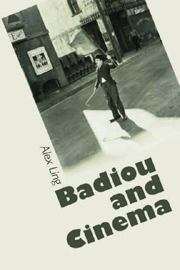Book contents
- Frontmatter
- Contents
- Acknowledgements
- Abbreviations of Frequently Cited Texts
- Introduction: Gorky's Maxim
- 1 Presenting Alain Badiou
- 2 Can Cinema be Thought?
- 3 In the Kingdom of Shadows
- 4 An Aesthetic of Truth
- 5 An Instant or an Eternity: Thinking Cinema After Deleuze
- 6 Alain Resnais and the Mise en Scène of Two
- 7 The Castle of Impurity
- Conclusion: The Future of an Illusion
- Bibliography
- Filmography
- Index
7 - The Castle of Impurity
Published online by Cambridge University Press: 12 September 2012
- Frontmatter
- Contents
- Acknowledgements
- Abbreviations of Frequently Cited Texts
- Introduction: Gorky's Maxim
- 1 Presenting Alain Badiou
- 2 Can Cinema be Thought?
- 3 In the Kingdom of Shadows
- 4 An Aesthetic of Truth
- 5 An Instant or an Eternity: Thinking Cinema After Deleuze
- 6 Alain Resnais and the Mise en Scène of Two
- 7 The Castle of Impurity
- Conclusion: The Future of an Illusion
- Bibliography
- Filmography
- Index
Summary
I ask not for the great, the remote, the romantic; what is doing in Italy or Arabia; what is Greek art or provincial minstrelsy; I embrace the common, I explore and sit at the feet of the familiar, the low.
Ralph Waldo EmersonFifteen theses on impurification
It has to be made clear once and for all that if cinema is an art it cannot simply be an amalgam of the principles of other, contiguous art forms: only having done that can we turn to the question of the allegedly composite nature of films.
Andrey TarkovskyWe begin this final chapter with a difficult but fundamental thesis: cinema is an inessential art. Obviously this is not to say that cinema is unimportant artistically; rather, cinema is an art devoid of essence. We have seen something of this thesis already, in our assertion that cinema is at base a superficial art, an art of surfaces (it cuts from what appears, not what is). For if film is, as Badiou states, at its heart ‘nothing but takes and montage’, then it can by definition have no essential properties. Or again, there is no such thing as ‘quintessential’ or ‘pure cinema’ (save in the impotent dream of a blank screen on which is projected a silent and imageless vacuum). For a ‘take’ must first be understood in its literal sense – as something that is ‘taken’, ‘held up’, wrested from its proper place – while ‘montage’ is itself nothing but a film's final arrangement (qua statist counting), the ultimate coupling and uncoupling of all of these ‘taken takes’.
- Type
- Chapter
- Information
- Badiou and Cinema , pp. 160 - 189Publisher: Edinburgh University PressPrint publication year: 2010



